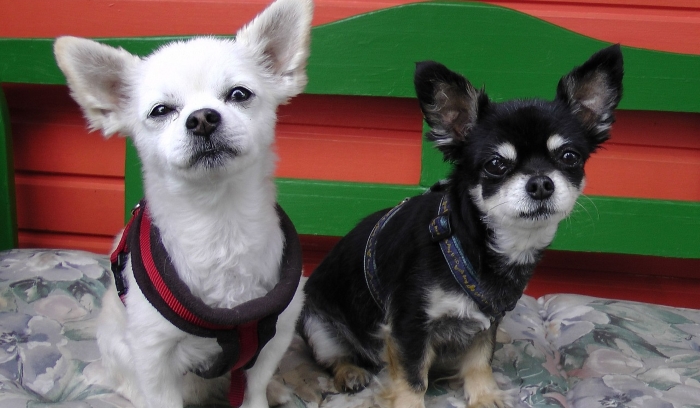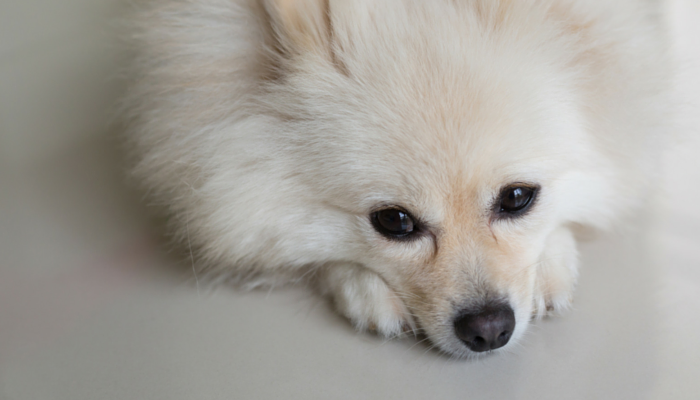When you’re raising a puppy, a parade of behavioral problems may pass through your life and your puppy’s life. Separation anxiety (SA) can be one of them. Knowing and recognizing SA will equip you to take all necessary precautions to avoid the condition as well as to treat it as soon as any symptoms appear. Although older dogs can develop SA, the Tufts Animal Behavior Clinic states that it typically affects young dogs. Therefore, avoid brushing this off as something to worry about later by stopping puppy separation anxiety in its tracks.
Dog separation anxiety manifests as extreme stress from the time you leave him alone until you come back, whether in a puppy or an adult dog. His actions will suggest that he is terrified to be alone in the house, though the symptoms can vary. Patricia McConnell, Ph. D. is regarded as an authority on SA. She is a zoologist and a Certified Applied Animal Behaviorist. Although we can’t know for sure what’s on a dog’s mind, she claims in her book I’ll Be Home Soon that SA can be compared to a panic attack.
The good news is that you’re hopefully already laying the groundwork for a well-adjusted, well-behaved dog as a responsible puppy owner. Puppy education, socialization, crate training, and teaching your pup to appreciate solitude all help. Consequently, many of the suggestions made here are things you already do or have done. That said, SA does present some unique challenges.
My Puppy Has Dog Separation. What Should I Do?

You should act right away if you notice that your pet is displaying severe separation anxiety symptoms. Here are some of our best suggestions for keeping your anxious dog secure and at ease!
A Second Dog Will Cure Your Dog’s Anxiety
It’s a pretty common misconception that getting a second dog can help with a dog’s separation anxiety. And I can see why; on its own, it seems to be beneficial. Getting a second dog seems like a great idea in theory; your new dog will help keep your current one company, right? Sadly, this isn’t how things usually turn out. However, there is no guarantee that it will; getting a second dog is not a remedy for separation anxiety.
It may be tempting to get another dog if your current dog experiences separation anxiety in order to make them feel less lonely while you’re away. The issue is that dogs who experience separation anxiety don’t feel lonely; instead, they experience anxiety when their owner leaves.
When their owner(s) are not present, anxious dogs experience separation anxiety. While having a companion may make them feel less lonely, there is no assurance that this will reduce their anxiety. Regardless of the number of other animals you have in the house, they become anxious when their owner leaves.
Your anxious dog may find some solace from other animals, but they can’t treat their separation anxiety. One of three things will occur if you get a second dog because your first one suffers from separation anxiety:
The issue is that there is no way to ensure that the third possibility will materialize. Although getting a new dog might help your dog feel less lonely, it is unlikely to eliminate their separation anxiety.
Furthermore, keep in mind that dogs can teach one another, so it’s possible that your current dog will teach your new dog that being anxious when you leave is “normal.” This is especially true if the second dog you’re thinking about is a young puppy that is easily influenced. The worst-case scenario is that you might have two dogs who struggle with separation anxiety.
Though it’s a significant commitment, getting a second dog can be a wise decision. Do it for the right reasons. Get a second dog because you want one, not because you need one to protect your first one.

Although crate training isn’t a bad idea in and of itself, it’s not a surefire way to treat separation anxiety. It all depends on how your dog initially perceives their crate.
Making your dog comfortable with their crate before using it makes sense if you want to keep them safe while you’re away if they have separation anxiety. For most dogs that takes a bit of time. If your dog doesn’t like their crate in the first place, they won’t like it (or feel safe) when you leave them in it.
When you leave, putting your dog in their crate can exacerbate their anxiety if they don’t already feel secure there or try to avoid it as much as possible. They’ll be anxious because they feel trapped in a place where they don’t feel safe, in addition to being anxious because you’ve left.
If you want to crate your dog when you leave you’ll need to work on getting them completely comfortable with it first. Encourage your dog to use their crate by showing them that the crate isn’t a place to be scared of — it’s one where good things happen. If you’re not familiar with this process crate training games are a tremendous help.
Working to make your dog completely at ease in their crate can be very beneficial for anxiety. Everything depends on whether the comfort the crate offers outweighs the worry they experience when you leave for work.
Exercise can reduce some destructive behaviors, but it might not be sufficient to treat separation anxiety on its own. Now, I’m not one to say you shouldn’t exercise your dog more; almost all dogs would profit from doing so. But what I’m trying to say is that not all separation anxiety can be cured by exercise alone.
Exercise is known to reduce anxiety in both humans and dogs, but it’s typically combined with other forms of treatment. Although exercise can reduce your dog’s anxiety, it may not be sufficient on its own.
The majority of us leave for work in the morning, which means that many dogs don’t get a chance to burn off any energy before we leave (this can be particularly problematic for young, energetic dogs). Take your dog for a quick walk or jog in the morning before you leave for work, or squeeze in a quick game of tug or fetch.
There are no drawbacks to giving your dog extra exercise before you leave, but it might not be enough on its own to keep them calm as you’re leaving.
Give your dog something to do as you’re leaving if giving them more exercise doesn’t help. If your dog gets anxious when you’re getting ready for work in the morning, give them a Kong filled with treats that you’ve frozen overnight. Because Kongs are unbreakable (at least for my dog), I prefer using them and feel comfortable leaving my dog with them.
Stuffed Kongs are effective because they provide your dog with something to do while you’re gone, diverting their attention from you. Since they take a while to complete and are mentally stimulating, they are incredibly effective at keeping a dog’s attention.

Only leave your puppy alone when it is appropriate.
Puppies shouldn’t be left alone for extended periods of time, especially when they’re still very young. If your puppy is young, it’s likely that you’re still potty training him, so you’ll need to make sure you’re taking him out frequently enough for him to establish a routine. Dogs absorb everything they see around them when they are puppies, and a lonely, bored puppy can develop into an insecure and unhappy adult dog. If you recently added a puppy to your household and work full-time, you might want to pay a friend or dog sitter to visit them every few hours to see how they’re doing.
FAQ
How do you break a puppy from separation anxiety?
- Every time you go out, give your dog a special treat (such as a puzzle toy filled with peanut butter).
- Keep your arrivals and departures low-key and avoid exchanging many greetings
- Leave some recently worn clothes out that smell like you.
- Consider giving your pet over-the-counter natural calming supplements.
How long does separation anxiety last in dogs?
Work with your dog for approximately two months to help him overcome his separation anxiety. Making your dog comfortable right before you leave by starting out slowly will enable you to extend your time away much more quickly in the later stages.
At what age do puppies show separation anxiety?
Are older animals less likely to experience separation anxiety if I adopt them? “In dogs, the onset of separation anxiety most frequently appears before 2 years of age.